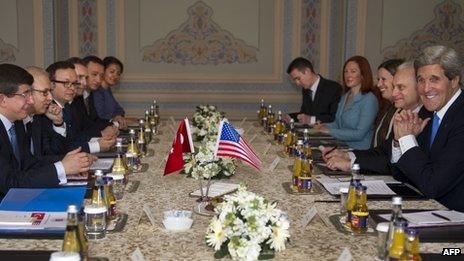Kerry warns Iran time for nuclear talks is limited
- Published

John Kerry (right, foreground) is seen here facing Turkish Foreign Minister Ahmet Davutoglu (opposite) at talks in Istanbul
US Secretary of State John Kerry has warned Iran that talks on its nuclear programme cannot last forever, after a new round failed to make progress.
"This is not an interminable process," he said at the start of a trip to the Middle East, Europe and Asia.
At talks in Istanbul, Mr Kerry also called on Turkey and Israel to restore full diplomatic relations.
Later he discussed reviving the Middle East peace process with Palestinian President Mahmoud Abbas in Ramallah.
Details of the meeting in the West Bank were not released.
Mr Kerry is due to meet Palestinian Prime Minister Salam Fayyad and Israeli President Shimon Peres on Monday, and Israeli Prime Minister Benjamin Netanyahu on Tuesday.
'Painful task'
Earlier, in Istanbul, Mr Kerry said after talks with Turkish Foreign Minister Ahmet Davutoglu that he saw Turkey as an "important contributor" to efforts to achieve peace in the Middle East.
On Iran, Mr Kerry said President Barack Obama was committed to continuing the diplomatic process, despite what he called the complicating factor of elections there in June.
"Diplomacy is a painful task," the secretary of state said, "and a task for the patient."
World powers suspect Iran of pursuing a covert nuclear weapons programme.
Tehran, which insists its intentions are peaceful, is negotiating with the so-called P5+1 group comprising the five permanent members of the UN Security Council - the US, Russia, China, the UK and France - plus Germany.
No new round of talks was scheduled after two days of negotiations in Almaty, Kazakhstan, which ended on Saturday.
'Back on track'
After recently helping broker a reconciliation between Turkey and Israel, Mr Kerry said: "We would like to see this relationship that is important to stability in the Middle East and critical to the peace process... get back on track in its full measure.''
That, he told reporters in Istanbul, meant promises of "compensation be fulfilled, ambassadors be returned and full relations be embraced".
Mr Davutoglu said Turkey would be "careful" in its approach, and stressed that Israeli trade restrictions on the Gaza Strip "should be eliminated once and for all".
Mr Kerry also met Turkish Prime Minister Recep Tayyip Erdogan.
More than 1.2 million people have fled to neighbouring countries since the unrest in Syria began two years ago, according to UN figures.
At least 250,000 are in Turkey.
Both Turkey and the US oppose Syrian President Bashar al-Assad, with Turkey holding that the West should do more to help the Syrian opposition.
Afghan deaths
The start of Mr Kerry's trip was overshadowed by the death of six Americans, along with an Afghan doctor, in two attacks in Afghanistan.
The Americans included a foreign service officer who had acted as Mr Kerry's guide during his recent visit to Kabul.
Anne Smedinghoff, 25, had been delivering books to students in southern Zabul province.
She was the first US diplomat killed in service since last year's attacks in the Libyan city of Benghazi.
Speaking to US consulate workers in Istanbul, Mr Kerry said Ms Smedinghoff's death was a "grim reminder... of how important, but also how risky, carrying the future is".
- Published7 April 2013
- Published6 April 2013
- Published6 April 2013
- Published23 March 2013
- Published5 April 2013